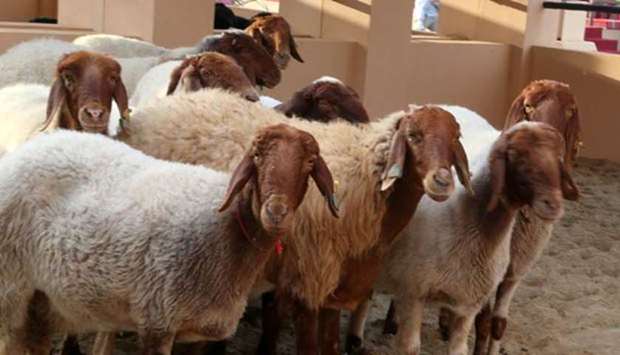The ‘Al Nukhba’ (elite) auction of special breeds of sheep and goats, as well as educational and art activities, marked the opening of the 7th edition of Halal Qatar Festival on Friday at the southern area of Katara – the Cultural Village.
The inauguration of the nine-day festival, expected to attract a large number of people due to its wide range of unique offerings this year, was led by Katara general manager Dr Khalid bin Ibrahim al-Sulaiti.
“We have expanded the area for this year’s edition of Halal Qatar Festival to feature more pavilions, shops, activities and competitions like Al Mazayin (a beauty contest for goats and sheep),” he told reporters.

Halal Qatar Festival runs until March 10.
Dr al-Sulaiti said the festival is set to welcome students from various schools across Qatar from Saturday (from 8am to 12noon) until March 10 - aimed at “keeping the new generation in touch with the history and heritage of their fathers and grandfathers.”
He noted that the children will have the opportunity to take part in eight workshops at the event, including painting, sculpture, pottery and livestock-related activities.
From these workshops and activities, students will get a deeper understanding of how their ancestors made a living during their time, the Katara chief stressed.
“We are keeping the new generation up-to-date. We invited Qatari and international schools to bring their students to this festival in the morning,” Dr al-Sulaiti said.
He stressed that the organising committee worked hard in preparing its various offerings and facilities for livestock breeders, visitors and participants for the Al Mazayin competition.
Many livestock breeders, livestock and veterinary shop owners were among the participants in the festival, in addition to other related professions, according to Dr al-Sulaiti.
He pointed out that the Halal Qatar Festival is one of the largest and most important events that Katara hosts to preserve Qatari heritage.
“Among its significant role in exposing the youth on the culture of our ancestors is by offering an opportunity for Katara audiences to witness various sheep breeding aspects”, Dr al-Sulaiti added.
The 2018 edition of the festival is also featuring photography exhibitions, traditional food at several stalls, folkloric songs and traditional games, as well as an old souq, traditional tent, horse and camel rides.
“Stalls offer 100% halal products such as laban and butter, among others, including traditional items like perfumes," Dr al-Sulaiti said. “We have a bigger area for the competition and many of the participants came from other GCC countries such as Oman and Kuwait.”
According to Katara, the Ministry of Municipality and Environment’s livestock department also conducts educational activities for visitors, showcasing Qatar’s livestock sector.
Citing its growing popularity, Dr al-Sulaiti added they always try to feature something new at each edition of the festival.
“We have expanded the area for this year’s edition of Halal Qatar Festival to feature more pavilions, shops, activities and competitions like Al Mazayin (a beauty contest for goats and sheep),” he told reporters.

Halal Qatar Festival runs until March 10.
Dr al-Sulaiti said the festival is set to welcome students from various schools across Qatar from Saturday (from 8am to 12noon) until March 10 - aimed at “keeping the new generation in touch with the history and heritage of their fathers and grandfathers.”
He noted that the children will have the opportunity to take part in eight workshops at the event, including painting, sculpture, pottery and livestock-related activities.
From these workshops and activities, students will get a deeper understanding of how their ancestors made a living during their time, the Katara chief stressed.
“We are keeping the new generation up-to-date. We invited Qatari and international schools to bring their students to this festival in the morning,” Dr al-Sulaiti said.
He stressed that the organising committee worked hard in preparing its various offerings and facilities for livestock breeders, visitors and participants for the Al Mazayin competition.
Many livestock breeders, livestock and veterinary shop owners were among the participants in the festival, in addition to other related professions, according to Dr al-Sulaiti.
He pointed out that the Halal Qatar Festival is one of the largest and most important events that Katara hosts to preserve Qatari heritage.
“Among its significant role in exposing the youth on the culture of our ancestors is by offering an opportunity for Katara audiences to witness various sheep breeding aspects”, Dr al-Sulaiti added.
The 2018 edition of the festival is also featuring photography exhibitions, traditional food at several stalls, folkloric songs and traditional games, as well as an old souq, traditional tent, horse and camel rides.
“Stalls offer 100% halal products such as laban and butter, among others, including traditional items like perfumes," Dr al-Sulaiti said. “We have a bigger area for the competition and many of the participants came from other GCC countries such as Oman and Kuwait.”
According to Katara, the Ministry of Municipality and Environment’s livestock department also conducts educational activities for visitors, showcasing Qatar’s livestock sector.
Citing its growing popularity, Dr al-Sulaiti added they always try to feature something new at each edition of the festival.


